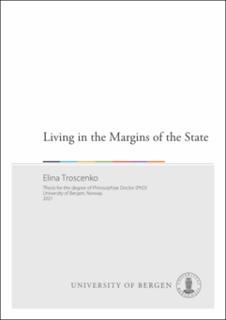Living in the Margins of the State
Doctoral thesis
Permanent lenke
https://hdl.handle.net/11250/2728259Utgivelsesdato
2021-02-26Metadata
Vis full innførselSamlinger
Sammendrag
This thesis explores the various forms of state manifestation in the lives of the Uzbek population living in the borderlands of Kyrgyzstan. With a particular focus on the stateless persons amongst this group, the thesis examines how the state materialises, manifests and transcends the lives of Uzbeks living in the physical, social and legal margins of the state. Based on fieldwork conducted along the militarized Kyrgyz-Uzbek border from 2013–2014, the ethnography presented in this work illuminates how people are experiencing, interacting and dealing with such manifestations of the state as borders, document practices and citizenship regime.
This work addresses the scarcity of literature on statelessness in Central Asia and on rural Uzbek communities in Kyrgyzstan expanding the knowledge and understanding of the lived realities of this community by exploring how their worlds have been both shattered and coalesced through various political projects that temporarily both inhibits and facilities the existence of their cross-border social worlds.
This thesis explores how the state is shaping the lives of the people who have become entangled with the increased presence of the state in the form of physical border barriers, state documentation practices and the prevalent citizenship regime.
It particularly looks at the physical manifestation of the state boundaries, namely the borders and their morphology, illustrating how the physical presence of the borders have created new ways of socialising for a community whose lives transcend and spill over the state boundaries. By illuminating how the particular morphology of the border shapes and directs sociality, this work calls for more attention to the materiality of borders in the anthropological literature. Furthermore, this thesis advances the anthropological understanding of the state’s manifestation process itself by illustrating it’s fluctuating presence. The thesis shows how through scrutinising people’s engagement with documents, the temporal dynamic of state’s spatialising practices become visible. Finally, this thesis illustrates how the most prominent material artefact denoting the citizenship status, the passport, is central to the way people narrate their experiences of statelessness and to their understandings of citizenship status as such.
This work advances the study of statelessness by focusing on the statelessness experiences and understandings of this status, rather than its legal dimensions, and argues for the incorporation of a spatial dimension and documentation aspects in exploring how people situate their lives in spaces where the nation-state is not always the main point of reference. Attending to such material state manifestations as borders and documents, this thesis highlights how locating the state in its concrete expressions in everyday lives enables us to explore the ways the state becomes present and transcends the lives of people, and how people on their own behalf engage with these state manifestations.
Består av
Paper I: Troscenko, Elina. 2016. “With a Border Fence in the Backyard: Materialisation of the Border in the Landscape and the Social Lives’ of Border People.” In Eurasian Borderlands: Spatialising Borders in the Aftermath of State Collapse, edited by T. Bringa and H. Toje, 87–106. New York: Palgrave Macmillan. Full text not available in BORA due to publisher restrictions. The article is available at: https://doi.org/10.1057/978-1-137-58309-3Paper II: Troscenko, Elina. 2020. “From Mice-Eaten Passports to Fingerprint Scanning: Fluctuating State Presence and ‘Entangled Documents’ Along the Kyrgyz– Uzbek Border.” Central Asian Survey 39(2): 236–254. The article is available at: https://hdl.handle.net/11250/2728253
Paper III: Troscenko, Elina. “Without the State, between the States. Statelessness amongst the Uzbeks in Kyrgyzstan”. Not available in BORA.

